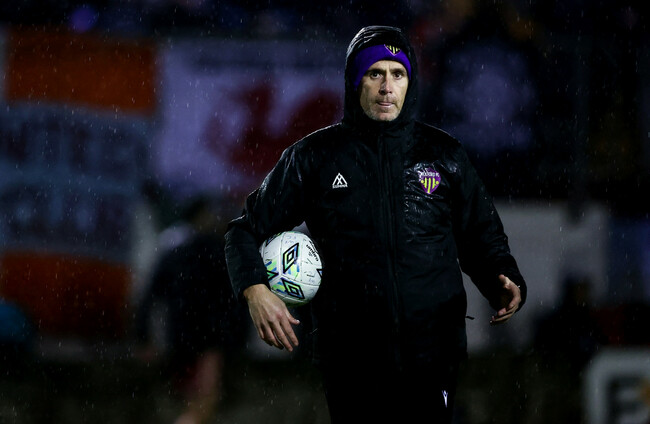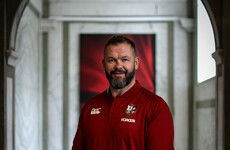FROM THE outset, the odds were stacked against Wexford and James Keddy.
The club were working off a tight budget with limited resources.
So, at the start of the season, if you were to offer them the chance to be in contention for the playoffs at this stage and a first-ever FAI Cup semi-final spot, it’s fair to say they would have taken it.
It is a young squad that has had to rely on a quartet of loanees — Divin Isamala (Bohemians), Sean McHale (St Patrick’s Athletic), Lewis Temple (Shelbourne) and Conor Walsh (Sligo Rovers).
Another promising talent, Kian Corbally, has impressed, as have the more experienced pair of Ethan Boyle and Mikie Rowe, who is near the top of the First Division scoring charts with 12 goals in 32 appearances.
This afternoon’s clash is not exactly a David-v-Goliath encounter — Drogheda United have other issues as they battle to avoid relegation from the Premier Division.
Nonetheless, as the top-flight club with home advantage, Kevin Doherty’s team will be considered the favourites to advance.
And whoever wins today will certainly be underdogs in the final, as Derry City aim to win the trophy for the second time in three seasons.
Regardless, Wexford boss James Keddy, the former League of Ireland star who won the Premier Division three times as a player feels it has been a good season and believes winning today and guiding the team to a major final would be “probably my best achievement in football”.
He adds: “We are a small club, new ownership there last year, and a different club than it was years ago, with decent people running it.
“To bring a club that small to the cup final in the Aviva would be brilliant.”
The Dubliner says his side have managed to lessen the “silly mistakes” hurting the team in the first part of the campaign, though he acknowledges inconsistency is expected with young players.
Keddy describes today’s game as a “free hit” for his men, given that Drogheda have the more experienced individuals and are widely expected to prevail.
So what needs to happen for an upset to occur?
“We probably have to defend better than we have done all season,” Keddy tells The 42. “All our lads realistically would have to play eight or nine out of 10.
“I’ve played in four semi-finals as a player and never lost one. I wouldn’t like to lose one as a manager.
“So I’d be confident that we’ll perform well. Obviously, we’ve young players, and sometimes young players get a little bit nervous. It’s up to myself and my staff to manage that as well on the day.
“You want to come back in after the game and have no regrets. If my lads perform well and get beaten, I’ll be able to take it.”
Despite an illustrious playing career, 51-year-old Keddy only became a League of Ireland manager for the first time in 2022.
Before then, he was Director of Football overseeing the schoolboy set-up at Home Farm and also worked as assistant manager with Bray Wanderers and Longford Town alongside Gary Cronin.
At the time of writing, the Ferrycarrig Park outfit are just inside the playoff places in fifth.
The team’s strengths are obvious. Only champions Cork City have scored more goals than Wexford in the First Division this season.
On the other hand, only three teams have conceded more, so it could well be a high-scoring affair this afternoon.
If pushed, Keddy suggests he would prefer winning the cup to gaining promotion at the end of the season.
It makes sense, at least on a romantic level. Promoted teams are seldom remembered, whereas sides such St Francis, the non-league outfit that reached the FAI Cup final in 1990, tend to be spoken about years after the event.
You could argue Wexford reaching the final would be just as big an achievement as St Francis doing so.
These days, the gap between the top teams in Ireland and the rest is more pronounced than ever.
Keddy cannot even afford to dedicate himself solely to football. He is a spark by trade whose phone “never stops with the football”.
The squad train twice a week in Carlow IT, normally on Mondays and Wednesdays to prepare for their usual Friday matchday.
Roughly half the group are from Dublin with the rest based in different parts of the country.
“Lads look after the recovery sessions themselves,” Keddy adds.
“If we had an extra night of training, it’s too much travelling so you don’t get that freshness on a Friday. So we must train at 100% on both days.”
And are there any plans to follow the considerable number of Irish clubs that have gone full-time in recent years?
“I don’t know the long-term plans for the club. I haven’t discussed it. My contract is up this year and we haven’t discussed anything. It’s up to the powers that be to discuss what the long-term plan is. But with the stadium being built in the middle of the town in the next few years, that’s a big plus for the club.
“They’re after getting a good grant [from the government] so there’s loads to look forward to.”
Keddy continues: “I’d love it to be full-time. But listen, it’s not there. I don’t think the money is in the country to do it.
“I think, being honest with you, if you’re in the Premier Division in Ireland, you have to be full-time.
“I think they’re nearly all full-time now except Drogheda are kind of in transition, they’re half and half at the moment.
“But for the league to be taken seriously in Europe, you have to be full-time. It’s too hard to be part-time. It’s the only way to go. But you need money, you need investment.”
Describing himself as “quiet by nature,” Keddy is more of a manager in the Carlo Ancelotti than Jose Mourinho mode.
“I don’t get too hot and bothered about anything in football,” he says.
“I’m quiet on the line — I don’t like shouting at players. I leave them alone during the game. It’s hard to affect stuff during the game as well.
“I try and give them confidence before the game, and make sure that they believe in themselves — and enjoy the game. Because, with football, your career goes quickly.
“One regret I have is I didn’t really enjoy moments that I should have more when I was a player. Small things like that you reflect upon when you’re older, and realise I should have enjoyed that moment a bit more.”
As a footballer, Keddy worked with some of the most successful and best-known coaches in the League of Ireland, including Stephen Kenny, Liam Tuohy, Paul Doolin, Dermot Keely, Liam Buckley and Felix Healy.
Nowadays, he sometimes picks up the phone to chat and bounce ideas off former coaches. He also appreciates the contrasting qualities that brought them success.
“Liam [Tuohy] was very good, he knew how to get fellas going. How to flip their light switch. Just knew everyone individually.
“Paul was fantastic on the training ground and good for a chat. Stephen was very good with people.
“Dermot was a very intelligent bloke, and very good at signing players. His recruitment was always good at most of his clubs.
“Felix stood out for me when he was with Derry — a little bit different. He could talk about anything, about life in general. He had great belief in himself, great belief in his team. I would have taken a lot from Felix and still give him a ring for advice — himself and Paul would be good for advice because I got on well with them and they’re very experienced blokes.”
Yet most of the people mentioned above are no longer working in management. Consequently, Keddy appreciates the offer that belatedly came his way and suggests taking the circuitous route to become a League of Ireland boss did him no harm in the long run.
“The problem is the young coaches now get their badges but don’t do the hard yards.
“So with coaching and managing and all this, you learn loads — it doesn’t matter what environment you’re in. You learn by doing.”














Great article. Best of luck with your career
Cap him